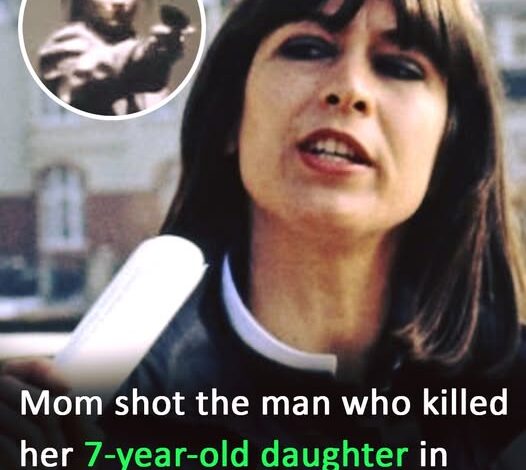The Extraordinary Story of Marianne Bachmeier and a Mother’s Fight for Justice

On the morning of March 6, 1981, in Lübeck, Germany, Marianne Bachmeier entered a packed courtroom with a composed yet determined demeanor. Inside her handbag was a small pistol. Within minutes, she stood, drew the weapon, and fired seven shots at Klaus Grabowski—the man on trial for kidnapping, abusing, and killing her seven-year-old daughter, Anna. Grabowski collapsed and died instantly on the courtroom floor, leaving the public in shock.
Marianne was taken into custody on the spot, yet showed no sign of remorse. In her mind, she had delivered the kind of justice the legal system could never provide. Her action, raw and startling, ignited an international debate that would endure for decades, touching on grief, retribution, and the blurred boundary between lawful justice and vigilantism.
Her road to that day had been marked by hardship long before Anna’s death. Born into a troubled household, Marianne’s father had served in the Waffen-SS during Nazi Germany, casting a shadow over her early life. She endured abuse, instability, and trauma, becoming pregnant at sixteen and placing her first child for adoption—a decision she repeated two years later. But in 1973, when Anna was born, she resolved to raise her as a single mother, vowing to give her a better life.
Anna was a cheerful, affectionate child deeply bonded with her mother. The two lived modestly in Lübeck, where Marianne managed a small pub. That fragile peace shattered on May 5, 1980, when Anna, after a minor disagreement, skipped school to visit a friend—but never made it. Along the way, she encountered Klaus Grabowski, a 35-year-old convicted sex offender who had previously molested two young girls.
Grabowski’s history was disturbing. While imprisoned for earlier crimes, he had undergone voluntary chemical castration, only to later seek hormone treatments to reverse it. At the time of Anna’s disappearance, he was living with his fiancée and had returned quietly to society. He held Anna in his apartment for hours, abused her, and then strangled her. He hid her body in a box and left it by a canal. His fiancée, appalled, eventually alerted authorities, leading to his arrest that same night.
But his arrest offered Marianne no relief. During the trial, Grabowski shocked the courtroom by claiming that Anna had tried to seduce and blackmail him—an outrageous lie that deepened Marianne’s anguish. Day after day, she sat through testimony that sullied her daughter’s memory. By the third day, her grief had hardened into resolve. Concealing the pistol in her handbag, she entered the courtroom, waited for her moment, then stood and shot him seven times. Witnesses remembered her calling him a “pig” right after pulling the trigger.
Her own trial the following year riveted the nation. Initially charged with murder, she testified that she had acted in a trance, haunted by visions of Anna. However, evidence suggested planning—her knowledge of firearms, her steady execution, and even a note found during psychiatric evaluation reading, “I did it for you, Anna,” with seven hearts symbolizing each year of her daughter’s life.
The public was deeply divided. Some saw her as a devastated mother pushed past her limits, doing what the courts could not. Others viewed her as a vigilante who undermined the rule of law. Early media sympathy shifted as journalists dug into her past—her difficult youth, her work in a bar, and the children she had given up—fueling controversy.
Ultimately, she was convicted of premeditated manslaughter and unlawful possession of a firearm. Sentenced to six years, she served only three before being released. National surveys reflected the split: about a third felt the sentence was fair, another third too harsh, and the rest too lenient.
After her release, Marianne withdrew from the spotlight. She moved to Nigeria, married a German teacher, and later lived in Sicily before returning to Lübeck in the 1990s, following a diagnosis of pancreatic cancer. She occasionally gave interviews, openly admitting the shooting was intentional—her way of ensuring Grabowski’s lies would never again be spoken.
On September 17, 1996, Marianne passed away and was buried next to Anna, their graves standing as a lasting reminder of the tragedy that bound them. Her case still stirs fierce debate: Was she a grieving mother pushed beyond reason, or a dangerous example of vengeance replacing justice?
Whatever the answer, Marianne Bachmeier’s story compels us to face uncomfortable questions about justice, loss, and the limits of human endurance. It remains a tale of immense sorrow, unwavering love, and the extreme actions a parent might take when they believe the system has failed the innocent.